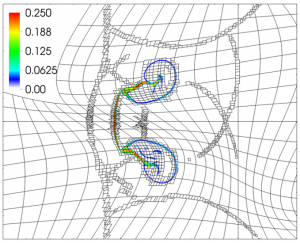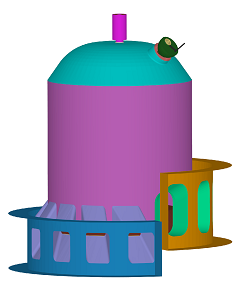RESEARCH GOALS
- To advance the state-of-the-art CFD algorithms and high performance computing (HPC) on energy-efficient parallel computer architectures
- To design, analyze, and optimize next generation low-emission and high-efficiency combustion systems and turbomachinery with geometric complexity
- To achieve high-fidelity full engine simulations on leadership computing facilities

RESEARCH CAPABILITIES
Chord, our in-house CFD code, is a highly-parallel, fourth-order accurate, solution-adaptive, finite-volume CFD algorithm on a structured grid. The AMR is constructed using the Chombo parallel AMR library. Chord solves the system of governing equations for transient, compressible, viscous gaseous flows, both non-reacting and reacting.
Numerical Capabilities:
- Accuracy: Fourth-order, Godunov-type finite-volume method
- Efficiency: Parallel, adaptive mesh refinement (AMR)
- High-fidelity representation of engineering geometries with complexity: Embedded boundary (EB) technique and mapped grids
- Scalability: 100,000 cores for AMR, 10,000 cores for EB

Application Capabilities:
- Fundamental studies of multi-scale, multi-physics compressible flows (for example, fully-resolved flame characteristics of gaseous fuels)
- CFD-based design, analysis, and optimization of turbomachinery and combustion devices (for example, compressor, gas-turbine combustor)


COMPUTING FACILITIES
We perform our calculations on ISTeC Cray High Performance Computing (HPC) System for large jobs and on Atlantis Cluster for medium jobs.
The ISTeC Cray is a Model XE6 with 2,688 compute cores, 2.5 TB of main memory, a Gemini 3D-torus interconnect and 32 TB of disk storage.
The Atlantis Cluster is HPC infrastructure in the CFD & Propulsion Laboratory at Colorado State University. It consists of:
- Master node
- 2x 6-core, 2.1 GHz CPU, 15 MB L3 Cache CPU
- 64 GB DDR3 (100 GB/s bandwidth)
- RAID controllers
- Storage
- 26 TB (usable) in RAID 6 + 2 hot spares
- Compute nodes
- 2x 10-core, 2.5 GHz, 25 MB L3 cache Intel E5-2670 v2 CPU
- 128 GB DDR3 (100 GB/s bandwidth)
- 1x Nvidia Kepler K20 GPU
- 40 GB/s bandwidth interconnect
- New 5x Boeing compute nodes
- 2x 12-core, 2.3 GHz, 30 MB L3 cache Intel E5-2670 v3 CPU
- 64 GB DDR4 (136 GB/s bandwidth)
RESEARCH PROJECTS
- Accurately-posed direct numerical simulation of turbulent combustion, funded by Air Force Office of Scientific Research.
- Adaptive nonlinear, non-Gaussian, and high-dimensional filters, funded by National Science Foundation.
- Improving the correlation between CFD analysis and physical test results of fuel valves research area, funded by Woodward Inc.
- The loop chain abstraction for balancing locality and parallelism, funded by National Science Foundation.
- High-pressure system analysis, funded by Boeing Company.
- CFD analysis of flow conditioner’s effects on flow profile and velocity measurement accuracy in a natural gas metering station, funded by Spectra Energy.
- CFD analysis of the heat transfer characteristics and the effect of thermowells used in natural gas measurement facilities, funded by Pipeline Research Council International.
- Extreme resilient discretizations, funded by the Office of Advanced Scientific Computing Research, Department of Energy.
- A high-fidelity computational tool for low-speed combustion in a practical burner geometry, funded by Department of Energy.
- A node-level programming model framework for exascale computing, funded by Lawrence Livermore National Laboratory.
- Numerical simulation of complex turbulent flows over wind turbines and bluff bodies, funded by King Abdullah University of Science and Technology.
- Flame modeling, funded by Boeing Company.
- Engine fan modeling, funded by Boeing Company.
- Fourth-order parallel AMR compressible Navier-Stokes solver, funded by Colorado State University.
- Numerical simulation of natural gas reciprocating engines, funded by Colorado State University.

